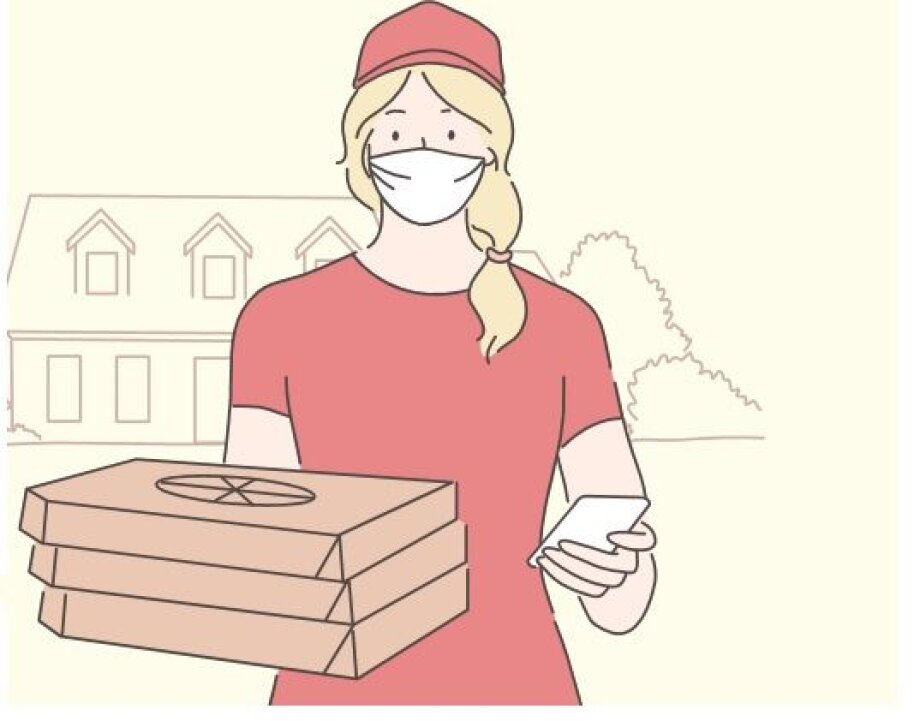With consumers shifting to online shopping, the brick-and-mortar retail environment faces a hard time due to competition from e-commerce giants such as Amazon and Alibaba. The former saw online grocery sales triple year-on-year during the second quarter as people stayed indoors due to lockdown. And the latter announced a new air route that aims to shorten delivery times to some parts of Europe by 30 percent. In Europe, as many as 40 percent of respondents said that they purchased more items online, including supplies and groceries, since the pandemic began, Comscore, an American media measurement and analytics firm, has reported.
Major retailers, operating in Poland, such as Biedronka, Auchan and Carrefour, quickly reacted to the spike in online orders. All of them started cooperation with Spanish startup Glovo, offering online delivery in less than an hour. The Barcelona-based business, which operates in more than 20 countries globally, came to Poland in July 2019. With the Glovo app, the users can order groceries, food from restaurants, coffee, medicines and other items. “Anything you want. Delivered in minutes” – states the slogan of the firm now present in over 15 Polish cities.
Biedronka offers free delivery for orders from PLN 199. Shoppers buying for more than PLN 149.99 get the delivery for PLN 5.99 and for smaller orders the delivery price goes up. “The average delivery time after placing an order is currently 45 minutes. Almost all orders are completed in less than an hour,” Paweł Włodarczyk, Biedronka operations director, claimed. He added that the online store is also open on non-trading Sundays. After the Sunday trade ban came into effect in Poland in 2018, the number of Sundays, when stores are open, were reduced to seven this year.
Despite the trade ban, Biedronka, Poland’s biggest food retailer that is owned by Portugal-headquartered Jerónimo Martins, showed a 10.9 percent increase in revenue year-on-year in the first half of 2020, when calculated in Polish currency and gained over 2 percentage points in market share.
French Auchan first tested deliveries with Glovo in the Ukrainian market and then agreed on cooperation in Poland, Spain and Portugal. In July, the retailer also launched click&collect service in Poland, initially available in six hypermarkets of the chain. Customers can select items online and pay after they pick them up in a store. “This is a response to the constantly changing preferences of our customers, especially in the recent period, when security issues have become particularly important,” Małgorzata Piekarska, brand director at Auchan Retail Polska, said. More than 60 percent of Poles believe that the habit of buying online will stay after the pandemic, a report published by Warsaw-based market researcher IRCenter, shows.
PARCEL LOCKERS AHEAD OF COURIERS
The largest logistics operator in Poland InPost, a subsidiary of global private equity firm Advent International, recorded a boom in orders since the beginning of the pandemic. They expanded the customer base to as much as 23 percent in the last seven months, InPost CEO Rafał Brzoska informed. They noticed an increase in online shopping for essential items such as groceries and cleaning products. “Due to the growing demand for Paczkomaty [package locker], we have also sped up the launch of our free solution called Multiskrytka – thanks to which our clients can pick up several packages just from one locker,” Brzoska said.
In 2020, the popularity of parcel lockers for the first time outperformed courier services in Poland. As many as 61 percent of online buyers chose package lockers compared to 55 percent for the courier. Deliveries through parcel lockers are more ecological compared to those by courier, InPost announced. In addition, parcel lockers allow contactless delivery, which is quickly gaining popularity due to risks related to Covid-19.
Poland-focused food delivery firm Pyszne.pl also introduced contactless service. The couriers are instructed to leave an order without physical contact with clients. Its parent organization Takeaway.com, with its main office in the Netherlands, launched this solution in all European countries, where it operates.

CONSUMER-CENTRIC BUSINESS
Businesses getting their online direct to consumers (d2c) strategies right could be an opportunity to build growth, market share and profitability, analysts from EY, a global professional services network, wrote. “The crisis has accelerated the long-running trend toward e-commerce, with 44 percent of consumers expecting to do more grocery shopping online and 39 percent expecting to do more durables shopping online over the next one to two years,” they said.
In Poland, the number of internet users, who buy online grew to over 70 percent this year, according to Gemius, an international research and technology company. A need for physical contact with a product is among the main reasons for those who prefer traditional stores. However, the lockdown restrictions have temporarily turned online shopping the only option in categories such as apparel or personal care. Consumers, reluctant to buy online, admitted that lower prices of products and deliveries as well as safer payment options may induce them to turn to e-tailers in the future, Gemius’s research shows.
In the new environment, there is a growing recognition that business should become more consumer-centric. With a shift in shopping behavior, retailers are buttressing their e-commerce and mobile presence to deliver on customer needs through digital-only channels. While Poland cut the delivery time to one hour, a London startup Weezy has launched a 15-minute grocery delivery service. After customers place an order through the app, it is packed at Weezy’s own fulfillment center and then delivered on electric scooters or bicycles. The company founders think they’ve spotted a gap in the market for an online grocery service that targets “time-poor professionals and parents,” TechCrunch, an American online publisher, reported. For a fee of £2.95 (about PLN 15), customers can get groceries not only from wholesalers but also from local stores and markets.
Many customers turned to online delivery during lockdowns, but even after the stores reopened, there are still fewer people due to social distancing rules and concerns about the spread of the virus. In the new reality, consumers want to shop safely, fast and close to home or without leaving their place at all. Online channels have become a saving grace for retailers that face extra coronavirus related costs. However, chains are challenged to fulfill their promise.
During the first months of the pandemic, Glovo peaked in orders, causing customers to wait. “We are very sorry. Due to high demand, we are currently not able to receive new orders,” their apologetic note read. Dealing with extended delivery times and technical issues, fulfilling stocks and adjusting logistics are some challenges players face when learning to satisfy the roaring needs of customers – old and new.



















